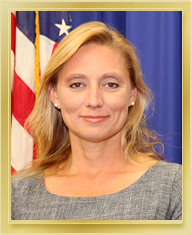
STATE REPRESENTATIVE
Michelle Cook

Serving the 65th Assembly District
Legislative Office Building, Room 4044
Hartford, CT 06106-1591
Capitol: 800-842-8267
Michelle.Cook@cga.ct.gov
ENCOURAGING BUSINESS GROWTH
We are always looking for ways to improve job opportunities and economic and business prospects in Connecticut. This year we created the Commission on Connecticut’s Leadership in Corporation and Business Law to explore ways to encourage businesses to incorporate in our state. By streamlining our business corporation laws and Judicial Branch operations, we will bring more businesses to our state.
MORE JOBS, BETTER JOBS
Creating more and better jobs for our citizens continues to be one of our top priorities. Three such initiatives include:
- creation of the Veterans Opportunity Fund, a pilot program that will help our veterans re-enter the workforce.
- providing assistance to the long-term unemployed in the form of job training, financial coaching and the opportunity to go back to school.
- more funding to give our economically disadvantaged youth more access to jobs and work experiences.
FUNDING FOR CITIES AND TOWNS
The state was able to make valuable investments and provide additional funding to our municipalities without raising taxes, while remaining under the spending cap. Cities and towns will see an additional $80 million in funding for education costs, Payments In Lieu of Taxes (PILOT) and other costs. By saving our municipalities money, we enable them to provide tax relief and make local capital investments.
ELIMINATING MUNICIPAL MANDATES
Many municipal leaders have testified before the legislature that state mandates have become a considerable burden on their budgets and for taxpayers. Some mandates not only cost towns significant revenue, but also take a substantial amount of time. The state legislature listened and removed some mandates that municipalities found to be non-essential.
Municipalities will no longer be required to issue a yearly report to the Connecticut Siting Council that details the locations of their existing telecommunications towers.
Municipalities will now only have to report their delinquent taxes to the Department of Motor Vehicles once each month instead of being required to do so in the first two weeks of the month.
PREVENTING SEXUAL ASSAULT AND INTIMATE PARTNER VIOLENCE ON CAMPUS
Every institution of higher education in the state is responsible for the welfare of its campus community. This year the Higher Education Committee reviewed the policies of higher education institutions as they relate to reporting and prevention of instances of sexual assault, stalking and intimate partner violence. The committee also took a look into the procedures of local, state and campus police to ensure that the voice of every victim of sexual assault is heard and that each victim understands his or her rights.
The result of the Higher Education Committee’s research was a law that requires reporting of every incident of intimate partner violence, sexual assault or stalking in a Campus Crime Report. In addition, the measure fosters community partnerships in prevention and awareness of sexual assault, intimate partner violence, and stalking by establishing campus resource teams, which will respond to incidents and review procedures of higher education institutions with which they are affiliated. Further, the institutions of higher education will be required to provide victims of sexual assault with written information that concisely informs them of their rights.
PROTECTING VICTIMS OF DOMESTIC VIOLENCE
Sometimes offenders who commit domestic violence or other acts against their family or spouses retaliate financially when their victims request a restraining order. To help prevent this, courts may now grant financial orders as part of the civil restraining order process. This change would permit the courts, among other things, to order the offender to maintain utilities and insurance for their victims. We also increased the penalty for criminal violation of restraining orders, protective orders and standing criminal protective orders involving such actions as threatening, harassing and assault from a Class D to a Class C felony.
THE NEW OFFICE OF EARLY CHILDHOOD
Early childhood education is critical to a child’s development, providing a solid foundation for future learning. This year, we formally established the Office of Early Childhood. It will administer programs and funding that affect our children from birth until elementary school. This coordinated system of care will better utilize, better educate and better care for our most impressionable population in an efficient and holistic way.
HELPING STUDENTS OVERCOME THE CHALLENGES POSED BY DYSLEXIA
Dyslexia is a serious learning disorder that is often misunderstood and frequently goes undetected for years. Early detection and treatment of dyslexia are crucial to helping students overcome the challenges posed by this disorder. This year the state Department of Education will add dyslexia to the individualized education program (IEP) form that planning and placement teams use to provide special education to students. Teacher preparation programs will also be required to include instruction on the identification of, and appropriate interventions for, students with dyslexia.
VO-TECH AND VO-AG SCHOOLS
In order to increase access for students to science and technology schools, we increased tuition payments the state will pay to these vo-tech schools. In addition, we increased investments in our vo-ag schools by offering grants to renovate facilities and improve school equipment.
MAKING OUR SCHOOLS SAFER
This year we authorized $22 million for another round of school security grants. This program helped many schools around the state add additional security infrastructure last year, with more than $21 million in grants distributed. The state’s technical schools, charter schools, private and endowed schools will be allowed to access the funds. $2.2 million has been set aside for private schools that will be reimbursed at 50 percent of eligible costs.
PROTECTING AGAINST SEXUAL ABUSE AND ASSAULT THROUGH EDUCATION
Stopping sexual abuse and assault must start early through education in our communities. The Department of Children and Families together with the Department of Education and Connecticut Sexual Assault Crisis Services, Inc. will identify and develop a statewide sexual abuse and assault awareness program for use by regional and local school boards. The State Board of Education must implement the program in each public school by October 15, 2015.
IMPROVING CARE FOR STROKE VICTIMS
Stroke is the fourth leading cause of death and a leading cause of serious, long-term adult disability in the United States. This year we established a task force to study issues related to stroke, including the feasibility of adopting a nationally recognized stroke assessment tool, a statewide hospital stroke designation program, and establishing emergency medical services care protocols for assessing, treating and transporting stroke victims.
HOME CARE FOR ADULTS WITH DISABILITIES
Connecticut’s Home Care Program for Adults with Disabilities (CHCPD) is a state-funded program that provides home -and community- based services to people with disabilities as an alternative to nursing home care. The number of people who may receive services through CHCPD will be increased from 50 to 100.
HELPING SENIORS PAY THEIR RENT
This year we re-opened the Renters’ Rebate program to eligible seniors and individuals with permanent disabilities to receive partial reimbursements related to rental payments. A total of $6.5 million in rental relief will be available to seniors, allowing an additional 12,700 seniors to receive a renter’s rebate.
THE ALZHEIMER’S DISEASE AND DEMENTIA TASK FORCE’S RECOMMENDATIONS ON TRAINING
Last year we created a task force that studied Alzheimer’s and dementia. The task force found that too few of the professionals who interact with people who suffer from these diseases were sufficiently educated about these conditions, nor trained in how best to help. This session, we adopted one of their recommendations – establishing mandatory Alzheimer’s and dementia training for those who provide direct care to patients and for people that help settle estates. Now, EMTs, probate judges, paid conservators, protective services employees, nursing home staff, home health agencies and assisted living agencies will receive training, along with ongoing education for nursing home administrators.

